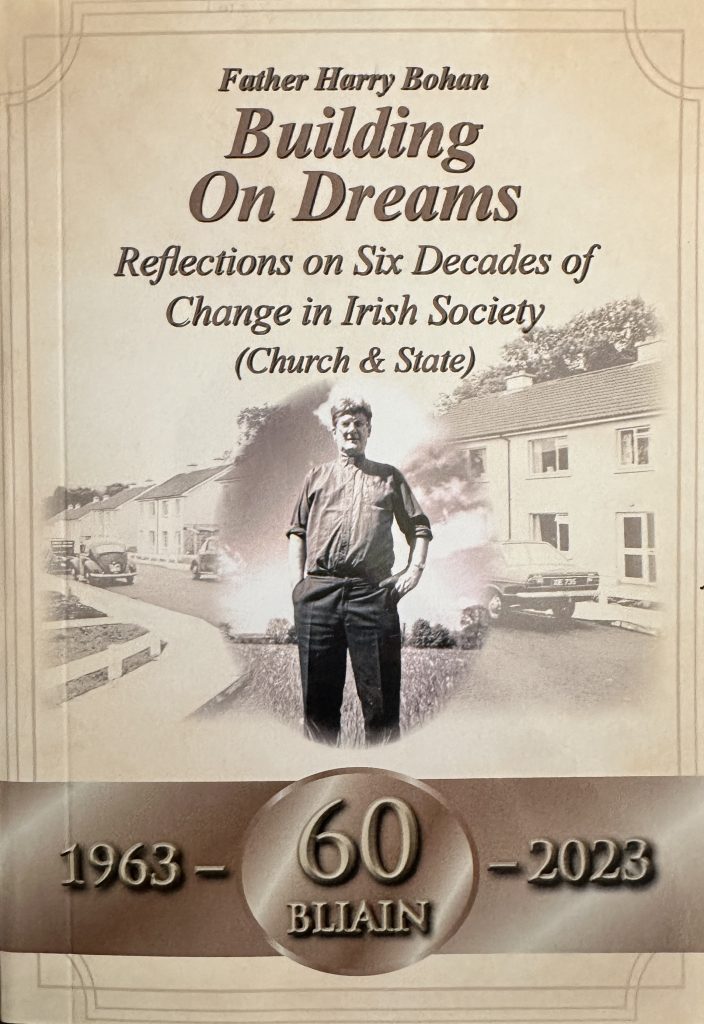I wrote this little book simply because I have lived through a period of extraordinary change. Its title is ‘Building on Dreams: Reflections on Six Decades of Change in Irish Society (Church & State)’.
I was ordained as a priest in 1963 in Maynooth College, one of 63 ordained there that year. The Ireland I was born into was very different to the one I was ordained into and the sixty years since. Irelands economic, social, cultural and religious landscape changed dramatically.
There are moments in history when people are called to re-invent themselves. The 1960’s was that time when Ireland and the Irish Church got that call. Up to that decade the country was predominantly an agricultural/rural society. It had two cities (by European Standards) Dublin and Cork, towns of various sizes, villages and open countryside. That was the settlement pattern. The bulk of decision making, both politically and institutionally, took place in Dublin. Agrarian values were very much to the fore. Up the the 1960’s, Irishness and Catholicism went hand in hand.
In the 1960’s the western world and Ireland in a very dramatic way, experienced extraordinary achievements. Young Irish people could now, for the first time in generations, find jobs at home. And there were other changes. A national television station, now experiencing some difficulties, was launched where shows like the Late Late Show enabled widespread discussion to take place on topics which otherwise had been swept under the carpet.
Young people rejected the restrictive moral values of previous generations. In 1967 free education was introduced, offering greater opportunities than ever before.
While the bulk of the growth took place in Dublin and the eastern part of the country, our area of Limerick, Ennis, Shannon, with the Airport as its hub became one of the significant growth Centres in the West of Ireland.
As a nation we began to reinvent ourselves economically and to some extent socially. Our values now moved towards economic values. We gradually came to know the price of everything but human and spiritual values went into decline.
It is worth noting that the church was called on to renew itself at that time too and to connect with the real world. The then Pope, John XXIII convened the second Vatican Council. One of the most important documents from that council was called ‘The Church in the Modern World’. When the Irish Church refused to change, that could be described as a lost opportunity.
The book goes on to describe significant changes over the next 60 years. They include periods of economic boom as was the period of the ‘Celtic Tiger’ and periods of economic bust. They include periods of major social and cultural changes. So much so that the culture or the way of life we now experience is not the same as even that of 25 years ago.
During this time the Church has experienced extraordinary Change. The Catholic Church influence is now at an all-time low. So much so that Pope Francis is now calling for profound change, and from the ground up.
People are asking ‘Where are the values to come from now?’ If the Church is to provide a response it must take the call of Pope Francis very seriously. The Church does not exist for itself. It exists in the world and for the world. There has been a significant shift in how the Church understands its role and that role must come from the people and reality of their lives. This must mean the participation of competent trained lay people who will have to play a significant part in this.
The book concludes with a message of hope. Many people are now searching. What is called the synodal journey the church is now on has to include a significant change in how it understands itself and how it presents the Christian message to the people.
The time has come when we don’t need preachers and teachers to tell us anymore. Events, challenges to family and community life, crime, greed, selfishness, climate change and many more are clearly indicating a need for basic values such as truth and trust.
In short, an economy where people matter, a society where meaning to life issues are as important, if not more important than economic growth.
Since the book was launched last December, there has been significant interest in it on the basis that it records an interesting period in our history.
Finally, could I suggest that Irish society, the Church and the State are at the point now where big choices have to be made about what direction we are taking and what values are shaping us.
Fr. Harry Bohan, Tradaree Pastoral Area, Diocese of Killaloe
Clare Champion Article 12th of April 2024
